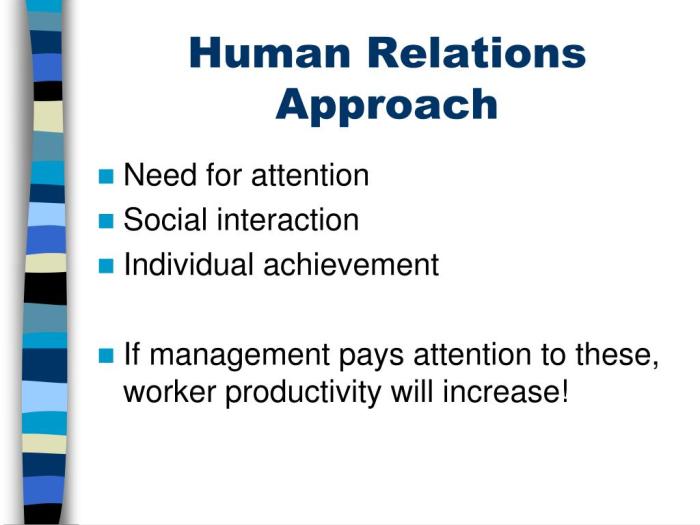The human relations approach to management lays emphasis on the significance of positive employee relations in driving organizational success. This approach recognizes the crucial role of human interaction, empathy, and motivation in fostering a productive and harmonious work environment.
By understanding and addressing the social and emotional needs of employees, organizations can create a workplace where individuals feel valued, respected, and motivated to contribute to the collective goals.
1. Importance of Human Relations in Management: The Human Relations Approach To Management Lays Emphasis On

Human relations play a pivotal role in effective management practices, fostering a positive work environment that enhances employee morale and productivity. Positive human relations create a sense of belonging, trust, and respect among employees, leading to improved communication, collaboration, and job satisfaction.
Studies have shown that organizations with strong human relations experience reduced turnover rates, increased employee engagement, and enhanced overall organizational performance.
Key Benefits of Positive Human Relations:
- Increased employee morale and motivation
- Improved communication and collaboration
- Enhanced job satisfaction and loyalty
- Reduced turnover rates and absenteeism
- Increased organizational productivity and success
Examples of Successful Implementations:, The human relations approach to management lays emphasis on
- Google: Known for its employee-centric culture that fosters open communication, collaboration, and professional development opportunities.
- Zappos: Emphasizes customer service and employee happiness, creating a positive and supportive work environment.
- Southwest Airlines: Renowned for its exceptional employee relations, resulting in high levels of employee satisfaction and loyalty.
Q&A
What are the key principles of the human relations approach to management?
The human relations approach is based on principles such as empathy, communication, motivation, and the recognition of individual needs and aspirations.
How does the human relations approach benefit organizations?
Organizations that adopt a human relations approach often experience improved employee morale, increased productivity, reduced absenteeism and turnover, and enhanced organizational success.
What are some challenges in implementing the human relations approach?
Challenges may include resistance to change, difficulty in measuring the impact of human relations initiatives, and the need for a supportive organizational culture.


